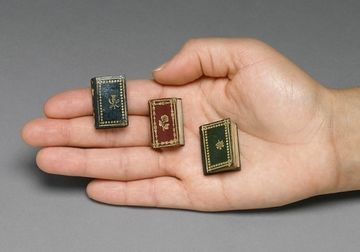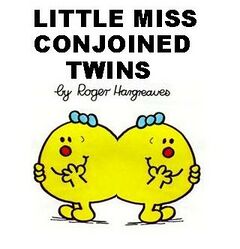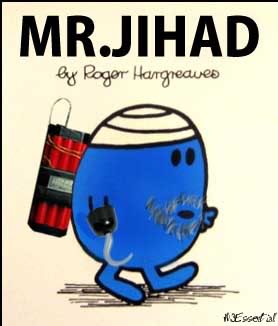Roger Hargreaves
Charles Roger Hargreaves (9 May 1935 – 11 September 1988) was an English children's writer and the best-selling author in modern history, having sold over 100 million "Mr. Men" books in fifteen languages. Hargreaves explains his success as being due to "writing really small books, ones with very few words".
Early life
Born "Carl-Heinz Hausmann" in Weimar, Germany, Roger Hargreaves attended the local primary school St Goebbels from 1932 until 1940, winning prizes for both artistic endeavour and youth propaganda. At twelve, Roger moved to the Ernst Röhm Gymnasium, a prestigious secondary school where his talents for English and Art could be developed. Although his work was praised by teachers, the young Roger found his time at the school difficult, made miserable by incessant bullying due to his distinctly square jawline and red complexion.
In 1942, and by now already calling himself Roger, Hausmann joined the Hitler Youth. His non-Aryan appearance went against him initially but a talent for marching, Jew-baiting, marching, invading neighbouring villages, marching and Gypsy-crucifying saw him quickly progress to the rank of Hauptgefolgschaftsführer ("Ethnic-cleansing Unit Leader"). In 1945 success in a colouring competition won him a "Dream Weekend", which saw Roger helping to liquidate the Warsaw Ghetto and supervising a transport of homosexuals and Trades-unionists to Dachau. But the good times couldn't last forever and within months he found himself interned by US forces.
Returning to Weimar following De-nazification, Roger found his family had perished in one of the final bombing raids of the war. His home gone, Roger wandered the back-roads of Germany until, by chance, he found himself working with the British army, translating for the Third Welsh Sheep-botherers. Roger was popular with the British troops and a success in his new role, though his commanding officer, Major Breville-Toaster, noted that Roger's reports were "a little brief, rather repetitive and illustrated with the most execrable drawings".
Three years later, the regiment was demobbed and Roger's prospects were uncertain. However, through the kindness of Breville-Toaster, Roger obtained permission to migrate to London where, contrary to expectation, he found the streets paved mostly with dog shit.
An author is born
The cruel streets of London were cold and unwelcoming. But Roger quickly made them his own, standing on the corner of a different one each night and accepting the money offered him by elderly gentlemen in trench-coats.
"I never knew why they gave me the cash," Roger recalled in later life. "They seemed a bit starved of affection. Clingy, really. I think they just felt sorry for me – there was so much bomb damage you could hardly rent a room but I never went short of a bed for the night."
Roger seemed to have thrown himself into his work and by 1954 he'd saved enough money to buy a cheap suit and present himself to the German Embassy, looking to make use of his translation-experience. Baron Hermann Von Munster must have been impressed as the young Roger was soon working as cultural attache and it was in this capacity that he met Peter Pennyfeather, owner-manager of Peccadillo Publishing house.
"I'd seen Peter before; he was a regular in Soho, but I don't think he recognised me from the front. I told him I had this idea for really tiny books and he was blown away. What with paper-rationing, it was the only way he could publish a new book each month. Having sold him on the idea I had to admit that I hadn't written anything yet and wasn't sure what to write about. Peter told me to write about what I knew."
Roger's social conscience
Despite the false start, Roger was soon on his way, publishing the hugely successful Mr. Small and following this with Mr. Smaller, Mr. Smallest and Mr. Microscopic. Eventually tiring of the formulaic nature of these offerings, Roger expanded his oeuvre and quickly produced Mr. Strong, Mr. Stronger and Mr. Strongest. The British public were smitten and the Mr. Men were on their way to becoming an international sensation.
The money was soon rolling in and toddlers everywhere just couldn't get enough of the Mr. Men. By 1958 Roger's cannon included Mr. Tall, Mr. Taller, Mr. Tallest, Mr. Short, Mr. Shorter, and Mr. Shortest as well Mr. Funny, Mr. Funnier and Mr. Funniest.
The plots were thrillingly simple: "I like to think that a child of six could understand the world of the Mr. Men without difficulty."
And indeed they could. Mr. Men books followed a pattern in which the responsibility-free hero woke up before walking around the garden without a care in the world, occasionally passing the time with a friendly earthworm. By page four the entertainment possibilities of the garden had generally been exhausted and it would be time to walk to town, stopping only to speak to strangers. Along the way, the hero would either make use of their particular ability to help an absent-minded wizard, or suffer a series of unfortunate, life-threatening accidents due to a peculiar deformity of mind or body.
"For a while I lost myself. The money, the groupies – it all went to my head. And the books rolled up to just the right size for snorting coke. I knew I had to do something better with my life."
But Roger couldn't let down his young following. Instead, he increasingly focused his work on publicising the fate of the less fortunate members of society. Mr. Kleptomania followed Mr. OCD, and soon Roger's work was being stocked by university psychology departments.
Roger the feminist
By 1975 there were over a thousand Mr. Men books and Roger began to suspect that the formula was becoming tired.
"But I couldn't just stop, there were toddlers relying on me and the prescription pain-killers didn't come cheap."
Fortunately, politics came to the rescue in the form of a militant lesbian movement, with the endearing habit of setting fire to their bras. History knows the movement as "Feminists" but then they were "The Droopy Dykes".
"One night it came to me, I'd been missing fifty percent of my readership for years. I suppose I just hadn't realise that females could read, but once I'd ploughed through Germaine Greer's Female Eunuch I knew they couldn't write either. That's when I knew I had to produce something aimed at girls."
Little Miss Tall, Little Miss Taller, and Little Miss Tallest followed Little Miss Short, Little Miss Shorter and Little Miss Shortest – soon the Little Miss series was as big a sensation as the Mr. Men. But Roger hadn't put away his social conscience.
"I wrote Little Miss Stress-Incontinence after the birth of my fourth child. It's a simple tale of a girl who wakes up, spend time in her garden, changes her underwear after digging, walks to town but then has to go home to change again after a dog barks unexpectedly at her. I had no idea it would be so well received by my audience's mothers."
In 1978 Peter Pennyfeather died following a massive felching overdose and Roger was devastated.
"Peter had been like my father, except Peter never beat me – not without paying extra. I decided to branch out to more challenging material, to take Peccadillo to new heights in his honour."
Later work
Roger the activist
By 1980 there were those who thought Hargreaves was washed up. Sales had reached a peak in the mid-seventies with Little Miss Impeach Nixon and there seemed no way to revive the franchise. Toddlers had found other heroes and Roger seemed at a loss where to go next.
"I felt my best work was behind me. 'Mr. Long-term Unemployed' just didn't seem to grab four-year-olds and hardly anyone had bought 'Little Miss Sex-Traffic'. I honestly thought I'd have to chuck it all in. But then someone gave a copy of 'Mr. Eco-Jew' to the Ayatollah Khomeini and suddenly there was this whole new market for my work in the Middle East. It was a set text for every toddler from Tehran to Tangiers. Although sales in the Tel Aviv area were a bit disappointing."
Roger found himself in deep water with the Campaign for Racial Equality but always insisted that it was undeserved: "They said Mr. Eco-Jew was Anti-Semitic but that's just political correctness gone mad. It's a story about a Mr. Man who just happens to be interested in Green issues – he's not even Jewish. People just read too much into his name."
The Nobel Committee snubbed Roger once again. "They quoted everything out of context. They took the opening lines ..."
| “ | Mr. Eco-Jew looked out of his window. The garden had been taken over by a Palestinian Refugee camp. ‘Oy,’ said Mr. Eco-Jew. ‘I’ll have to clear these farshtunken Arab vermin off the land or they’ll ruin the lawn.’ |
” |
"... and made it look like some sort of political statement."
Roger cashes in
In 1987 Roger retired to a Buddhist retreat. Cowed by the controversy his later work had stirred up he devoted the remainder of his life to yogic flying. In an act of defiance to the Capitalist world, he sold the Mr. Man Franchise to the highest bidder. The resulting publications were aimed to cash in on the emerging celebrity culture – they were not a critical success.
The biggest selling of these new-wave Mr. Men titles came in 1996 with Mr. Grunge. In this book Mr. Grunge woke up, put on a lumberjack shirt and some deck shoes, spent some time in the garden, walked to town, met and married a local tramp and shot himself in the head.
In Mr. T. the hero woke up, spent some time in the garden pitying fools, walked to town because he was afraid to fly, constructed a tank from egg-boxes and drove it through the wall of the bad guys' hide-out.





